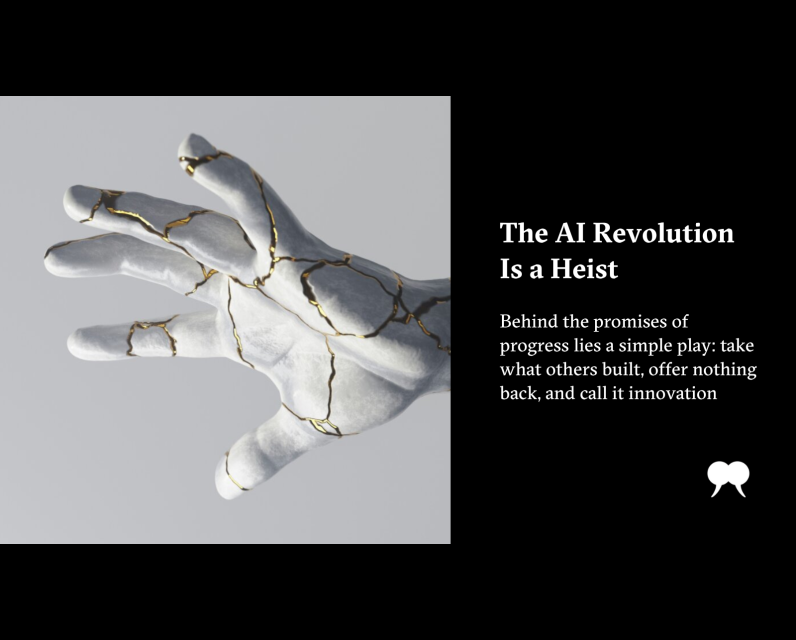The AI Revolution Is a Heist

None of the tech oligarchs currently promoting AI technology are even trying to pretend its impact will be gentle or gradual. If anything, most are positively effusive about how quickly it will render everything else—right down to people themselves—obsolete throughout a host of vital industries and in the arts.
It’s the kind of moment that invites a familiar concept: creative destruction. I originally associated the phrase with Joseph Schumpeter, but it actually has its origins in Karl Marx. In the latter’s work, it referred to the ingrained tendency of capitalism toward crisis (“In these crises,” write Marx and Engels in The Communist Manifesto, “a great part not only of existing production, but also of previously created productive forces, are periodically destroyed.”)
The former, for his part, was an Austrian economist in the sense of both background and outlook. In the seismic disruptions that typically accompany capitalism’s great transformations, Schumpeter saw an underlying dynamism at work beneath the chaos. Creative disruption, in the Schumpeterian sense, thus implies tumult but equally calls to mind grandness and innovation. To wit: through market competition, new technologies, new productive methods, and so on, capitalism might have a destructive effect on what already exists. It may destroy jobs or force factories to close. It may bring even the biggest corporate leviathans to their knees and eliminate the livelihoods they once sustained. The telos of this process, however, is ultimately progressive, even Promethean.
Something like this belief, it seems to me, has underwritten much of the techno-utopianism so in vogue throughout the past few decades. Unsurprisingly, it’s been especially ubiquitous in much of the mainstream discourse surrounding AI and a major talking point among its biggest boosters.
Even AI pessimists, I think, have tended to embrace a version of the same logic, albeit without the inane techno-positivity attached. In thinking about what AI is going to do to our society, the reigning instinct is to conjure the most dystopian scenarios imaginable. Once perfected, will AI-generated deepfakes accelerate the crisis of misinformation? Will self-driving cars decide they want to kill us? Will AI destroy sex and romance? Will our MacBooks suddenly start talking like HAL 9000 from 2001?
I suppose it’s too early to preclude any possibility outright. But some recent data on the effect AI is already having on the basic fabric of digital life raises an alternative (if no less potentially destructive) possibility. Writing for The Hub, Rudyard Griffiths recently detailed his losing battle with AI overviews—i.e., those things that now pop up on search engines every time you use them, even if you aren’t framing your searches in the form of a question. Noting how quickly these have changed his own habits, Griffiths goes on to cite some truly gobsmacking statistics:
According to recent studies, AI summaries have reduced website traffic by 30 to 70 percent, depending on the search term. Even more mind-blowing, upwards of 60 percent of all Google searches are now termed “zero-click,” or the user never leaves the Search Engine Results Page (SERP).For his part, Griffiths recognizes that the implications here—the increased centralization of data and information, a more homogenized online experience, etc.—will, in critical ways, be bad even if searches consequently become more reliable and efficient. Regardless, he rightly observes that the most profound effects will be material and economic, and I don’t see how anyone can possibly disagree with that conclusion.
Since the advent of the internet, a vast and global digital architecture has been built up around the basic assumption that people will seek out the information they need, products they’re hoping to buy, content they find entertaining, etc., then click on links and visit websites in order to find them. Entire media organizations, commercial enterprises, publishing efforts (and countless other things) rest entirely on this way of doing things and are certain to collapse if the rug is suddenly pulled out from underneath them.
In Schumpeter’s sense, this would simply be another instance of creative destruction—through which an older economic form is abruptly swept away in favour of something new and more efficient. But what is really going on here, I think, is in fact much more banal than this soaring tale of dynamism and progress suggests.
If they succeed in their current efforts, companies like Google will have done so mainly because they already control the most crucial nodes of digital exchange. When it comes to news, research, and plenty of other important things, their “innovation” will essentially consist of having devised a means of aggregating arguments and information that have already been gathered, organized, and accumulated by others without having to offer any compensation in return.
The effects of that might be profound, but nothing about the underlying process would be creative in any meaningful sense of the word, and big monopolies have been pursuing some version of it since the inception of capitalism itself: seeking ownership and control over vital infrastructure, co-opting or subordinating smaller actors in the marketplace, reducing business costs to increase their profits, and—most crucially of all—reducing the cost of labour to do the very same.
Here, we find not the constructive pattern envisioned by Schumpeter but the visceral instincts of capitalist predation taken yet again to their inevitable and logical conclusion. If the rapacious vanguardists of the AI revolution succeed in their designs, the impact will doubtless be significant and far reaching. The revolution itself, however, will have been anything but creative.
Adapted from “Uncreative Destruction” by Luke Savage (Substack). Reprinted with permission of the author.
The post The AI Revolution Is a Heist first appeared on The Walrus.



Comments
Be the first to comment